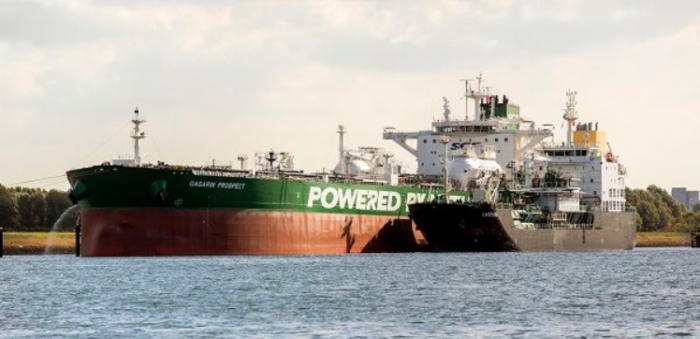In 2018, the sale of bunker oil in the Rotterdam bunker port fell from 9.9 million m3 to 9.5 million m3. This reduction can be explained by the decline in sales of heavy fuel oil from 8.3 million m3 to 7.9 million m3. On the other hand, the throughput of LNG as bunker fuel increased considerably from 1,500 to 9,500 tonnes.
The Port of Rotterdam Authority believes that the reduction in bunker volumes is due to the increased scale and use of modern vessels in container shipping. Supplies to container ships account for about 70% of the total Rotterdam bunker market.
[smlsubform prepend=”GET THE SAFETY4SEA IN YOUR INBOX!” showname=false emailtxt=”” emailholder=”Enter your email address” showsubmit=true submittxt=”Submit” jsthanks=false thankyou=”Thank you for subscribing to our mailing list”]
Meanwhile, LNG bunkering in Rotterdam is continuing, with Titan LNG, Shell and Anthony Veder having registered as LNG bunker specialists in the Rotterdam port. In fact, the Port Authority expects to have ten suppliers within five years and a significant increase in LNG bunkering.
What is more, the introduction of the ‘Timetobunker App’ was successful. The Port Authority began a trial last summer with bunker specialists VT Group, Unibarge, Titan LNG, FTS Hoftrans and Transnational Blenders, for digital bunker registration using this application. The app is now available to other bunker suppliers, and the ‘Timetobunker App’ is also live.
Bunker specialists in the Port of Rotterdam are now obliged to report to the Port Authority, before beginning each bunkering operation. Up until now, this was happening via VHF. As some 20,000 bunkering operations occur every year, the ability to register these online enables most of the processes to be automated and increases efficient operations. The application also allows the report to be submitted to both the Port Authority and Customs at the same time.
Finally, ahead of the 2020 sulphur cap, the oil product refineries and storage terminals in Rotterdam are preparing for the delivery and storage of so-called VLSFO (very low sulphur fuel oil), which contains the required 0.5% sulphur. Specifically, last week, the market marked the delivery of the first VLSFO bunkers in Rotterdam.






























































